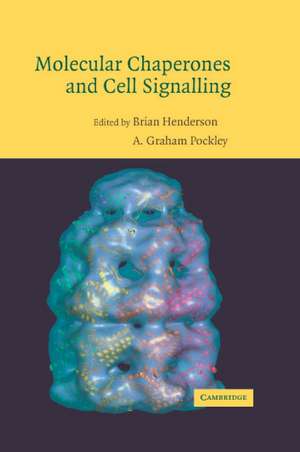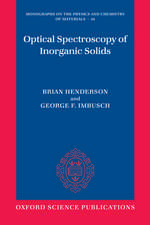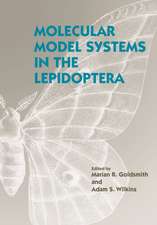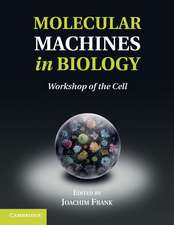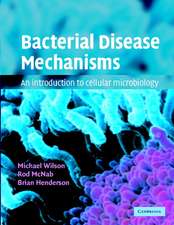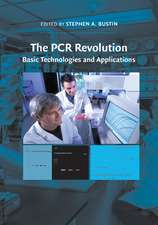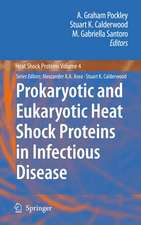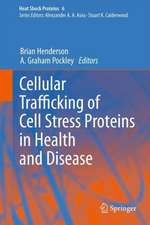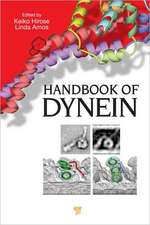Molecular Chaperones and Cell Signalling
Editat de Brian Henderson, A. Graham Pockleyen Limba Engleză Hardback – 17 iul 2005
| Toate formatele și edițiile | Preț | Express |
|---|---|---|
| Paperback (1) | 315.25 lei 6-8 săpt. | |
| Cambridge University Press – 2 mar 2011 | 315.25 lei 6-8 săpt. | |
| Hardback (1) | 601.04 lei 6-8 săpt. | |
| Cambridge University Press – 17 iul 2005 | 601.04 lei 6-8 săpt. |
Preț: 601.04 lei
Preț vechi: 675.33 lei
-11% Nou
Puncte Express: 902
Preț estimativ în valută:
115.02€ • 119.64$ • 94.96£
115.02€ • 119.64$ • 94.96£
Carte tipărită la comandă
Livrare economică 14-28 aprilie
Preluare comenzi: 021 569.72.76
Specificații
ISBN-13: 9780521836548
ISBN-10: 0521836549
Pagini: 346
Dimensiuni: 158 x 235 x 20 mm
Greutate: 0.57 kg
Ediția:New.
Editura: Cambridge University Press
Colecția Cambridge University Press
Locul publicării:New York, United States
ISBN-10: 0521836549
Pagini: 346
Dimensiuni: 158 x 235 x 20 mm
Greutate: 0.57 kg
Ediția:New.
Editura: Cambridge University Press
Colecția Cambridge University Press
Locul publicării:New York, United States
Cuprins
Preface; Part I. Molecular Chaperones and the Cell Stress Response: 1. Chaperone function: the orthodox view R. J. Ellis; 2. Intracellular disposition of mitochondrial molecular chaperones: Hsp60, mHsp70, Cpn10 and TRAP-1 R. S. Gupta, T. Bowes, S. Sadacharan and B. Singh; Part II. Changing Paradigms of Protein Trafficking and Protein Function: 3. Novel pathways of protein secretion G. Chimini and A. Rubartelli; 4. Moonlighting proteins: proteins with more than one function C. J. Jeffery; 5. Molecular chaperones: the unorthodox view B. Henderson and A. Shamaei-Tousi; Part III. Molecular Chaperones as Cell Regulators: 6. Cell-cell signalling properties of chaperonins A. R. M. Coates; 7. Toll-like receptor-dependent activation of antigen presenting cells by Hsp60, Hsp70 and Gp96 R. M. Vabulas and H. Wagner; 8. Regulation of signal transduction by intracellular and extracellular Hsp70 A. Asea and S. Calderwood; 9. Hsp72 and cell signalling M. Y. Sherman; 10. Heat shock proteins, their cell surface receptors and effect on the immune system T. Lehner, Y. Wang, T. Whittall and L. A. Bergmei; 11. Molecular chaperone-Cytokine interactions at the transcriptional level A. Stephanou and D. S. Latchman; Part IV. Physiological and Pathophysiological Signals: 12. Heat shock protein release and naturally-occurring exogenous heat shock proteins J. Frostegård and A. G. Pockley; 13. Hsp27 as an anti-inflammatory Protein K. Laudanski, A. De and C. Miller-Graziano; 14. Bip, a negative immune regulator involved in rheumatoid arthritis V. M. Corrigal and G. S. Panayi; Part V. Molecular Chaperones as Therapeutics: 15. Neuroendocrine aspects of the molecular chaperones ADNF and ADNP I. Gozes, I. Vulih, I. Spivak-Pohis and S. Furman; 16. Heat shock proteins regulate by both molecular and network cross-reactivity F. J. Quintana and I. R. Cohen; 17. Heat shock protein fusions: a platform for the induction of antigen-specific immunity L. Mizzen and J. Neefe; 18. Molecular chaperones as inducers of tumour immunity P. P. Bannerjee and Z. Li; Part VI. What Does the Future Hold?: 19. Gazing into the crystal ball: the unfolding future of molecular chaperones L. Hightower.
Descriere
This text reviews understanding of the biological roles of extracellular molecular chaperones.
